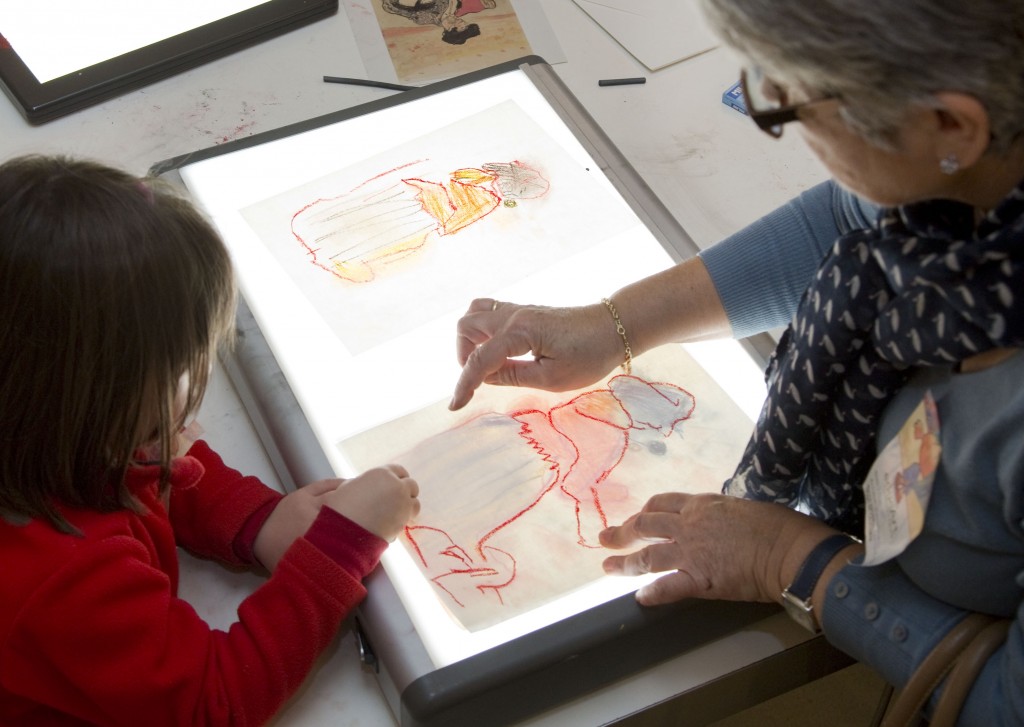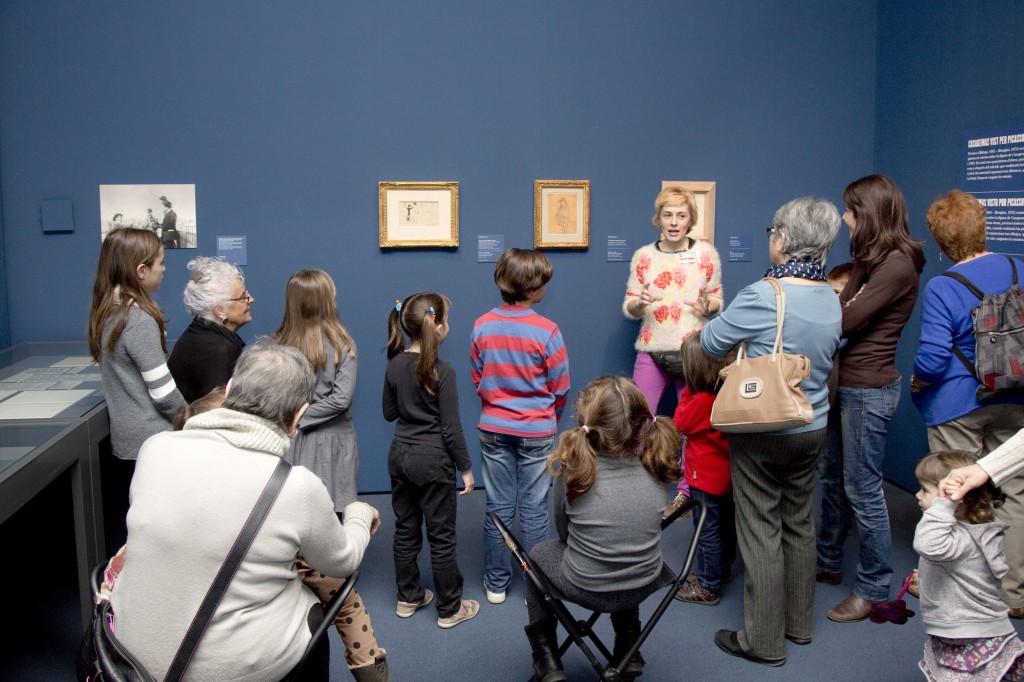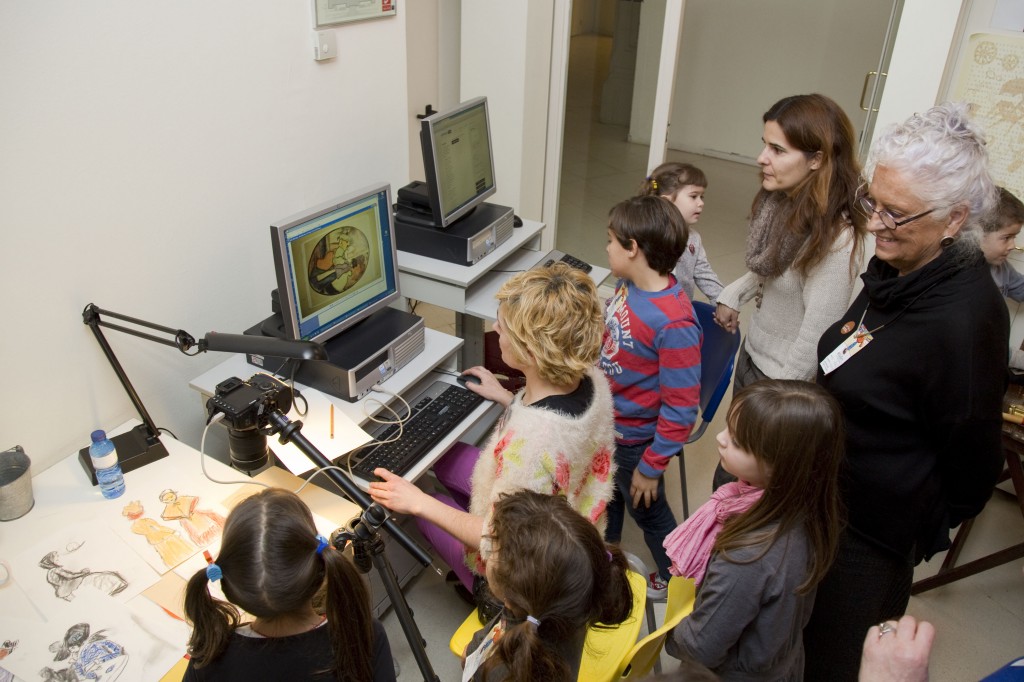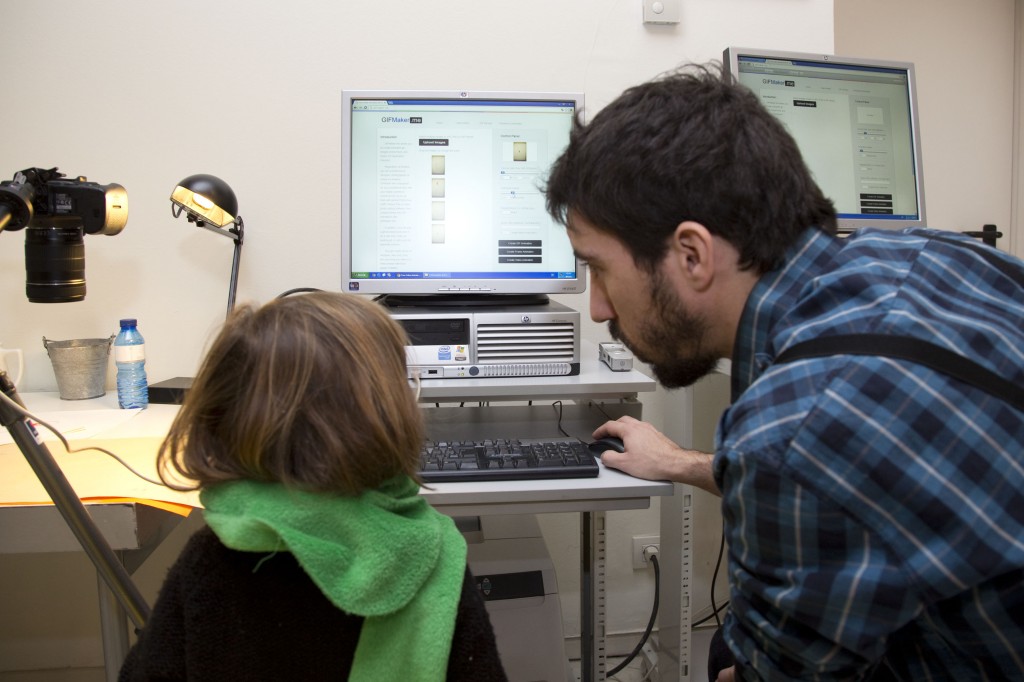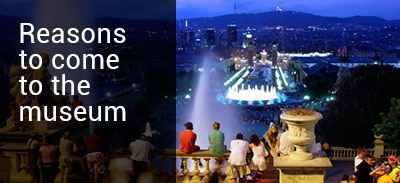A short story about the family workshop we held in the Museu Nacional
We’re going up the hill, it’s cold, it’s Saturday, these are Christmas days. It’s ten o’clock in the morning, the escalators leading to the museum are full of tourists taking selfies with their mobiles, smiling with their backs to the city.
Some early-risers, nearly all Japanese, with fantastic cameras, drinking steaming cups of coffee in front of the door of the museum. We go inside. We have to prepare the working space for the animation workshop that we are running on the occasion of the Carles Casagemas exhibition.
First of all we have to ask the security guard to unlock the door where we are working. We cross the Sala Oval with a guard.
We place paper, charcoal, and crayons on the light tables for tracing the drawings, and then run outside to look for the group of twelve people coming today.
Pepón: –Hey, an important thing is missing! Paint on your moustache!
Rafa: –You’re right, I almost forgot.
During the half hour of the session, when everyone has finished a mini-animation, we turn off the lights, place the cardboard on top of the monitor of the PC which is stamped and painted like the front of a stage, and each authors puts sound to their piece. Live, in real time. It is the moment to paint on a moustache and put on some make-up to help to suggest and feel a bit closer to 1900. Or at least to laugh at each other for a while.
But I’m painting myself before all of this happens, because prior to the workshop I’ve got to do a guided visit of the exhibition, and talking in front of the public is always difficult.
Pepón paints a moustache on me and I already feel much calmer.
Four families await me who have the faces of people who have just had breakfast and are just a bit sleepy.
The only thing they know about the exhibition is that it is of drawings and paintings and that are by someone who was a friend of Picasso.
Rafa: –It is all the work that it has been possible to find of this man, Carles Casagemas, who is this young gentleman you can see in the enormous poster, half Bob Dylan with hair like the Cure.
We go down to the room, the light changes, the sound gets smaller and makes it more intimate, the blue walls surround us and they explain to us the very short adventure of someone who disappeared quickly and badly.
The drawing, the drawing is present. Couples in the street, a guitar player walking, a lady waiting or relaxing. Scenes of brothels, women, more women, a “manola” dressed like a spectacle of colour. Human smell, tobacco, perfume, wind, coffee, touch.
There is a presence, the real presence of the models, but also that of the human being that is on the other side of the drawing, grabbed by charcoal with the aim of catching, capturing, freezing the moment, the space and the time by the art of magic. A magic that right now is here, that has survived the two people, the model and the artist, and is deployed filling us with echos.
Here is now. Now is always.
Rafa: –Let’s imagine we could give life to these characters, that in the corner of the frame of these paintings there was a play button and on pressing it, it sets it in motion. Well, that’s what we’re going to do in the workshop. To unfreeze this “photogram”, giving it continuity.
We’ve just seen the exhibition and we go back up, going upstairs as if we were rebuilding layers of history, a history that stays downstairs, in the past. We go up towards the light of the hill once again. The art classes should be like this. With the works present, in the museums and galleries, and connected to the creative activity that allows the students to take in the information in an involved, personal and live way.
While we walk towards the classroom, I explain to the group that Picasso and Casagemas travelled together to Paris for the first time, aiming to develop and present themselves. From among the many shows that were proposed to the visitors by the city of light, the Optical theatre was one of the notable novelties. It is easy to imagine the two young men attending some show of the first cinema. Charles-Émile Reynaud made himself known with his Bright Pantomimes that were a sort of very rudimentary animation, with the aim of being a narrative and very similar to the animated gifs that are now a trend on the net.
Anyway, it is the moment in which the cinema started up, a new tool that aimed to capture and portray the reality and to be able to show it in movement, in action.
On reaching the classroom we find on the table, colour photocopies of the works we’ve just seen, papers and the light table. The idea, after a short introduction to the cinema of animation because they do a drawing or tracing based on these copies, and with a collection of between three and eight drawings, is to propose an action that the character performs. An invented continuation. Without any artistic pretention, just for pleasure and as a game.
A simple online program allows us to show and visualize the moment. As always, when you are concentrating on drawing, the time flies by, it becomes quiet or with laughs, the ambience of the workshop is like that of a recently discovered tribe. Little by little the works are finished, each author gives a title to the work and they look for the sound that should accompany their pieces. We’re getting near the end of the journey. It’s time to get painted for the performance in the mini cardboard theatre and PC monitor.
Each one has to give a form and celebrate the result of their creativity with and for the rest.
Applause and warm farewells.
Related links
Animated images during the family activity Bright Pantomimes
http://ahomeinprogressfilm.com/
See more pictures of the activity
Rafa Castañer

